English CBSE Class 12 NCERT Flamingo Chapter 2 Lost Spring Free Solution of Extra Questions and Answers – Extract Based Questions Short Answer Questions Long Answer Questions and Value Based Questions
LOST SPRING
(Extra Questions)
Multiple Choice Questions
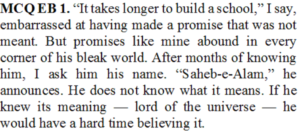

(i) “It takes longer to build a school,” What impact these words would have created on Saheb-e-Alam.
(a) anger
(b) disgust
(c) happiness
(d) disappointment
(ii) Why do you think Saheb would have had a hard time believing meaning of his name?
(a) because of his poor health
(b) because of his poor behaviour
(c) because of his poor financial condition
(d) because of his poor habits
(iii) Which word in the extract is antonym of ‘lack’?
(a) promise
(b) abound
(c) Alam
(d) bleak
(iv) Which of the following literary devices best describes the difference between the meaning of name of Saheb and his actual condition.
(a) simile
(b) hyperbole
(c) contrast
(d) metaphor
(v) According to the extract, since what period author knew Saheb?
(a) since one month
(b) since less than one month
(c) since more than one month
(d) cannot be ascertained
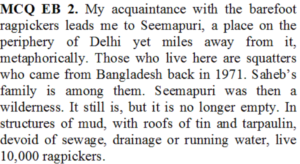

(i) Which of the following best describes the meaning of the line “Seemapuri, a place on the periphery of Delhi yet miles away from it, metaphorically”
(a) It takes lot of time to travel from Seemapuri to Delhi
(b) The facilities at Seemapuri are far less than those at Delhi
(c) It takes less time to travel from Seemapuri to Delhi
(d) Seemapuri is a better place than Delhi
(ii) Which of the following is not an attribute of Seemapuri?
(a) roofs of tin
(b) absence of sewage
(c) inhabited by squatters
(d) arrangements of running water
(iii) According to the extract what is the main profession of people living at Seemapuri
(a) squatters
(b) travelers
(c) ragpickers
(d) builders
(iv) In your opinion when was the main article of this extract written.
(a) In 1971
(b) Before 1971
(c) After 1971
(d) Cannot be derived from the extract
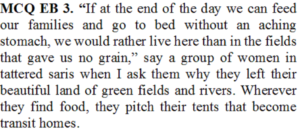

(i) What does the phrase ‘aching stomach’ as used in the extract mean
(a) Pain in stomach
(b) Action in the stomach
(c) Hunger
(d) Troubled stomach
(ii) What according to you might be the main concern of the people being talked about in the extract?
(a) shelter
(b) clothing
(c) food
(d) education
(iii) A phrase ‘pitch their tents’ has been used in the extract. Which of the following cannot be the correct use of similar phrase
1. pitch their voice
2. pitch their cars
3. pitch their support
4. pitch their hunger
(a) 1 and 4
(b) 2 and 3
(c) 3 and 4
(d) 2 and 4
(iv) What is implied by ‘transit homes’?
(a) tents
(b) tins
(c) temporary home
(d) triangular home
(v) ‘They’ left their home town because
(a) it was a beautiful area
(b) it had greenery
(c) it had rivers
(c) it starved them
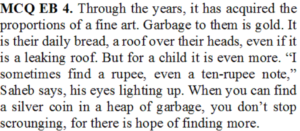

(i) ‘Garbage to them is gold.’ In this sentence the word ‘gold’ implies
(a) full of misfortune
(b) creation of wealth
(c) means of survival
(d) find of the day
(ii) Which of the following is not derived from garbage by the ragpickers ?
(a) roof
(b) food
(c) money
(d) honey
(iii) When a child finds currency or coin in the garbage, which of the following does not represent his emotions?
1. more efforts
2. more dejection
3. more hope
4. more darkness around eyes
(a) 1 and 4
(b) 2 and 3
(c)3 and 4
(d) 2 and 4
(iv) Which word as used in the extract is synonym of ‘pile’?
(a) gold
(b) find
(c) heap
(d) proportions
(v) What has acquired ‘proportions of fine art?
(a) collecting garbage
(b) collecting silver coins
(c) scrounging garbage
(d) earning the daily bread
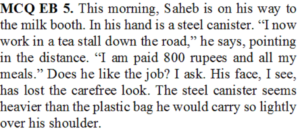

(i) Though each of the following words is a meaning of ‘stall’, which one best suits the meaning implied in the extract
(a) stop
(b) obstruct
(c) shop
(d) delay
(ii) Saheb’s acceptance of the job indicates which of the following parameter of life?
(a) exuberance
(b) hopelessness
(c) compromise
(d) coercion
(iii) Where was Saheb going when narrator met him?
(a) tea stall
(b) home
(c) milk booth
(d) play ground
(iv) Why did the steel canister feel heavier to Sahib?
(a) It’s weight was more
(b) It did not have light
(c) The bag was light
(d) He did not like the job
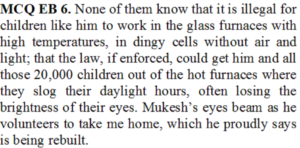

(i) What is not as per law can be called –
(a) non-lawless
(b) illegal
(c) in laws
(d) bylaws
(ii) Which of the following is not the description of area where children work ?
(a) glass furnace
(b) hot
(c) dark
(d) airy
(iii) What is the biggest danger to the children working in industry described in the extract?
(a) limbs
(b) vision
(c) taste
(d) smell
(iv) Which word in the extract represents ‘doing something due to one’s own wish’ ?
(a) illegal
(b) proudly
(c) volunteers
(d) enforced
(v) Why Mukesh has feeling of pride?
(a) He is earning
(b) He is healthy
(c) His house is being renovated
(d) Author is visiting his house
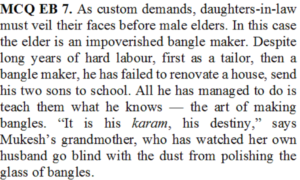

(i) Who is the ‘elder’ referred in the extract related to Mukesh?
(a) grandfather
(b) brother
(c) uncle
(d) father
(ii) “It is his karam, his destiny,” What emotion is expressed by the speaker through this line
(a) anger
(b) sorrow
(c) acceptance
(d) anxiety
(iii) Which of the following activities the ‘elder’ has not been able to do?
1. Working as a tailor
2. Schooling of his children
3. Making bangles
4. Recondition his house
5. Teaching art of bangle making to his kids
(a) 1 and 3
(b) 2 and 3
(c) 4 and 5
(d) 2 and 4
(iv) Who among the family of Mukesh had gone blind?
(a) his brother
(b) his father
(c) his grandmother
(d) his grandfather
(v) Which of the following word as used in the extract is synonymous to ‘in spite of’?
(a) custom
(b) despite
(c) destiny
(d) impoverished
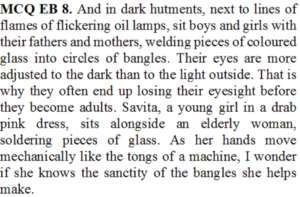

(i) According to the extract, why do many boys and girls lose their eye sight?
(a) They are deficient in Vitamin A
(b) They work in poor light
(c) They work in bright light
(d) It is their heredity
(ii) A phrase ‘end up losing their eyesight’ has been used in the extract. Considering all the uses of this phrase, which of the following in not the correct use of ‘end up’?
(a) end up gaining weight
(b) end up going to Australia
(c) end up accepting the proposal
(d) end up stop writing
(iii) Which of the following word as used in the extract imply ‘dull’?
(a) dark
(b) flickering
(c) drab
(d) tongs
(iv) ‘I wonder if she knows the sanctity of the bangles she helps make. The speaker is indicating which quality of ‘she’?
(a) sincerity
(b) ignorance
(c) diligence
(d) poverty
(v) Which of the following improvement will be most effective in reducing the chances of workers losing their eye sight?
(a) Making the work place more airy
(b) Stop flickering of the oil lamp
(c) Provide excellent illumination at the work place
(d) Give Vitamin A supplement
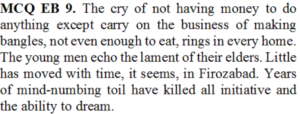

(i) Which, according to extract, is the most common situation among bangle makers?
(a) lamenting others
(b) lack of money
(c) lack of food
(d) compulsion to carry on the business
(ii) After reading the extract, do you agree that people of Firozabad work very hard?
(a) Yes
(b) Unlikely
(v) No
(d) No conclusion is possible
(iii) Which of the following effects is not caused by the long toil done by people of Firozabad?
1. Lack of food
2. Absence of initiatives
3. Echoing voice elders
4. Absence of dreams to improve
(a) 1 and 2
(b) 3 and 4
(c) 1 and 3
(d) 2 and 4
(iv) An expression ‘Little has moved with time’ has been used in the extract. Which of the following is not the correct use of similar expression
(a) Little has changed in my outlook
(b) Little has become more affordable
(c) Little one play more often
(d) Little has become more evident
(v) Meaning of which word / phrase in the extract is closest to ‘hard work’?
(a) cry
(b) carry on
(c) toil
(d) ability


(i) ‘When I sense a flash of it in Mukesh I am cheered.’ In this line to what does the word ‘it’ refers to.
(a) flash
(b) dare
(c) part
(d) mean
(ii) What is the dream of Mukesh?
(a) To walk
(b) To be away from home
(c) To be a mechanic
(d) To go to garage
(iii) Which of the following word as used in the extract is synonymous to ‘happy’?
(a) daring
(b) cheered
(c) insists
(d) repeats
(iv) Which of the following statement is false about Mukesh?
(a) Unlike many others, he has a dream
(b) He is ready to work hard for his dream
(c) He was not taught his dreams during his childhood
(d) He is arrogant
(v) Why, in your opinion Mukesh decides to walk to the garage?
(a) Garage is a long way from his home
(b) He does not have money to pay for other methods of travel
(c) Walking is his hobby
(d) He is health conscious
Extract Based Questions


1. From which country had Sheb come to India?
2. What does Saheb remember about his home?
3. Which word in the extract is opposite gender of ‘father’?
4. How did he lose his fields and home in Dhaka?
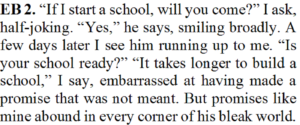

1. Who is referred as ‘you’ in the above extract?
2. Why was the narrator embarrassed?
3. Which word in the extract mean ‘several’?
4. Did Saheb ever go to school?


1. Who is referred as ‘he’ in the above extract?
2. What does ‘his’ name represent?
3. Which word in the extract mean ‘group’?
4. What did the boys used to do?
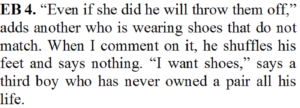

1. Who is referred as ‘she’ in the above extract?
2. Who had never worn shoes?
3. Which word in the extract is antonym of ‘always’?
4. The word ‘I’ has been used twice in above extract. Does this word refer to same person on both occasions?


1. Who is referred as ‘they’ in the above extract?
2. Which document helps them to buy grain?
3. Which word in the extract is antonym of ‘sell’?
4. How long have ‘they’ been living there?


1. Which game is being referred to in above extract?
2. Who is referred as ‘he’ in above extract?
3. Which word in the extract mean ‘satisfied’?
4. Behind whose fence is the speaker standing?


1. Whose dreams are being talked about in the above extract?
2. What is his dream?
3. Which word in the extract mean ‘not likely to be true’?
4. Why is Firozabad famous?


1. Who is referred as ‘a frail young woman’ in the above extract?
2. Where is the narrator standing now?
3. Apart from herself, how many members are in the family?
4. Which word in the extract is synonym of ‘complete’?


1. Who is referred as ‘he’ in the above extract?
2. What is his dream?
3. Which word in the extract mean ‘discomfort’?
4. In which town does ‘he’ live ?
Short Answer Questions – 30 to 40 words


Answer: Saheb was a young boy. He had shifted from Dhaka with his family.
Ragpicking was his first work. This was to support his family in earning livelihood.


Answer: The writer had promised to open a school of her own. Saheb had assured that he will study in her school.
The promise of opening the school was not fulfilled. The writer made a promise she was not serious about.


Answer: The writer noticed that many of the ragpickers are not wearing shoes. They tell the writer that it is their tradition not to wear shoes.
However, writer feels that it because of lack of money. By saying such statement they are trying to hide their ‘perpetual state of poverty’.


Answer: For parents scrounging garbage is a means of earning and their survival.
Many times children find something valuable in the garbage. So it is also a source of adventure, wonder and ‘treasure hunt’ for them.


Answer: Saheb was standing near the fenced gate of a club. He was watching people playing tennis.
Saheb says that he likes the game. He was satisfied to watch the game. When there is no one in the club, watchman allows him into the club. He uses swings in the club.


Answer: Saheb started working at the tea shop. He was not happy to work there.
He felt that he had lost his freedom. It is expressed by the writer that canister did not belong to him but the bag was his own.


Answer: Now Saheb has a regular income of Rs 800. He gets his full meal for the day.
But he had lost his freedom. The carefree expression on his face had disappeared.


Answer: Saheb used to live in Dhaka. They had their own fields there. His parent were farmers.
Owing to storm and floods their fields were destroyed. Their survival became difficult. So they came to Seemapuri in search of some work to sustain themselves.


Answer: Many times while searching heaps of garbage, children find valuable things like a ten rupee note or a silver coin. So to them it is an opportunity to discover something of value and wonder. In this context the term ‘scrounging for gold’ has been used.


Answer: The word ‘Saheb’ as used in Hindi means the superior in hierarchy. Saheb is not so. His full name is ‘Saheb e Alam’, which means lord of the universe. But Shaeb is leading life of poor man.
This is irony in the name of Saheb.


Answer: The author feels that they are not wearing footwear because they do not have enough money to buy footwear. Though they try to hide this fact by saying that it is their tradition not to wear footwear.


Answer: Mukesh is son of a poor bangle maker.
Mukesh wants to be a motor mechanic. He wants to drive a car. Owing to financially poor condition of his family, he may not realise his dream. Therefore writer calls it a ‘mirage amidst the dust’.


Answer: They see bangle in the house, in the yard, in every other house, every other yard, every street in Firozabad.
Bangles lie in mounds in unkempt yards. Bangles are piled on four wheeled handcarts.


Answer: They do not know that it is illegal to employ children at glass furnace. They do not know that it is also illegal to employ children in bangle making, polishing and soldering.
If law is enforced, about 20,000 children will be freed from working in such conditions.


Answer: The house is not fully built. Half portion of it has a thatched roof. They have a wood fired stove. The women of the house are week but they keep smiling.
The family of Mukesh is poor but they are leading a contended life.


Answer: Writer is talking about an old woman who got married long ago. Therefore she still has bangle in her wrist.
She has lived life of a poor. She did not have full meal on any day during her life. So she is sad about her plight.


Answer: They do not have enough money to do any thing other than bangle making. They do not earn enough to buy sufficient food for their family. Not many people are able to build their own houses.
Above are common complaints.


Answer: Most of the young men have fallen into the traps of middlemen. They fear that if they try to organize, police will beat them and put them into prison. A nexus exists between money lenders, middlemen and police.
They do not have a leader who thinks differently and can guide them.


Answer: The first world consists of their family caught in the web of perpetual poverty. It is also burdened by the caste they belong to.
The second world consists of the nexus among money lenders, middlemen, police, bureaucrats and politicians.
Bangle makers are caught between these two worlds and are never able to think differently.


Answer: Mukesh has the courage to think differently. He is determined to do something other than bangle making. He wants to be a motor mechanic and drive a car. He has also made a plan to achieve his ambition.


Answer: Mukesh lives at his original place but Shaeb has shifted from other country to Delhi.
Saheb does not have any opportunity to fulfil his dream because there is no school nearby. A garage not being very far from his place is an opportunity for Mukesh.
Saheb, by accepting a job at a tea stall, has resigned to his fate. Mukesh has made an action plan to learn the skill of motor mechanic.


Answer: Mukesh belongs to a very poor family. They cannot even afford to buy enough food to satiate hunger. So it could be difficult for the family to afford fees of learning car driving.
Thus dream of Mukesh looks like a mirage.


Answer: The author had asked Mukesh if he wanted to be a pilot. Mukesh had a discomfort that he did not have enough money to undergo training of pilot. But this was not a disappointment for him. He had made other plans to improve his life.


Answer: When the narrator advised Saheb to go to school, he had shines in his eyes. Saheb asked if the narrator would build a school for him. It appears that Saheb was not getting admission in existing schools.


Answer: Saheb was very much interested in going to school. He readily believed that narrator would open a school. Saheb became optimistic that soon he would be going to school. Later he was disappointed because school was not ready.


Answer: The custom of the house demands that daughters-in-law must veil their faces before male elders. So to maintain the custom of the house the woman wears a veil before male elders.


Answer: Family of Saheb owned a field near Dhaka. But many storms had destroyed their field and home. It was not possible to grow grain in the field.
So they came to India in search of food and for their survival.


Answer: Family of Mukesh and every other person of his society is engaged in making bangles. Mukesh does not want to adopt this tradition. He wants to do something different to alleviate poverty of his family. Such change will also ensure safety of his health. He is ready to make efforts to achieve his goal.
Therefore author sees a ray of hope.
Long Answer Questions – 120-150 words


Answer: Saheb is a young boy who does ragpicking. Sometimes he finds a ten rupee note or a silver coin in the garbage. Thus garbage for him is like gold. However the earnings from ragpicking is not steady. He accepts a job at a tea stall where he gets a fixed income of 800.
Saheb wants to go to school. He wants to wear shoes and play tennis. But he does not have the means to achieve his dreams. He does not appear to pursue his dreams through his deeds.
Mukesh is son of a poor bangle making parents. He wants to be a motor mechanic and drive a car. He wants to go to a garage to learn. He is ready to walk to the garage though it is a bit too far.
Saheb does not do anything to achieve his dreams while Mukesh is ready to extend himself. Hence it is possible though difficult for Mukesh to fulfil his dream
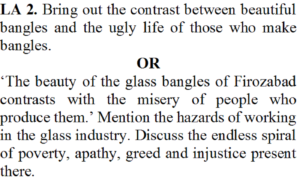

Answer: Bangle are very beautiful. These are considered auspicious for married women. Bangles are made in each of the seven colours of rainbow.
Bangle makers are very poor. Working conditions are bad. They need to work at the furnace which has high temperature. Polishing of spirals generates glass dust. Many bangle makers become blind because of this. Soldering of bangles is done in flickering oil lamp. The work area is poorly lit and has inadequate air circulation.
There is a nexus between money lenders, middlemen, police, bureaucrats and politicians to ensure their own interests. This works against the interest of bangle makers. They are never able to come out of their poverty. If anyone tries to do something different, police beats them and put them in prison.
Life of bangle makers is dull and full of sadness while colours of bangle represent vibrant shades and happiness.
This is the contrast between colours of bangles and life of bangle makers.


Answer: Bangle makers are very poor. Working conditions are bad. They need to work at the furnace which has high temperature. Polishing of spirals generates glass dust. Many bangle makers become blind because of this. Soldering of bangles is done in flickering oil lamp. The work area is poorly lit and has inadequate air circulation. They are not able to earn enough money to buy full meal for the family.
There is a nexus between money lenders, middlemen, police, bureaucrats and politicians. This works against the interest of bangle makers. If anyone tries to do something different, police beats them and put them in prison.
Since generations bangle makers are doing the same work. They do not have a leader to guide them. They are not able to think differently. Nor do they have any ambitions. They merely go on talking about their pathetic conditions.
Owing to above reasons, they remain in the web of perpetual poverty.


Answer:
Action is the key to fulfil dreams
Dreams are so important to us. They point a direction of a path we like to take. Let us remember that merely having a dream is of little use to us. We need to make it work. We need to fulfill it. The only way to achieve our goal is through taking action.
Actions need to be taken well in time. One who fails to utilize time is left with absence of time. Time is the most precious resource. Once lost it never comes back.
It is said that every journey is made up of small steps taken continuously one after the other. Even if a small action can be initiated today, it must be initiated.
Through continually taking action one can shape destiny. Merely dreaming about the dream leads nowhere but to misery.
Procrastination is the biggest evil. What can be done today should be done now. This is the ‘mantra’ of successfully realizing dreams.


Answer: Dreams represent ambition of a person. Many times a person is fed up of present situation. He / she dreams of better living conditions. While dreaming about better life, one tends to forget realities of life.
One may not have adequate resources or opportunities. Saheb dreams of studying in a school. But his neighbourhood does not have school. Saheb wants to play tennis. But he cannot pay fees of the club. Survival is more important for his family. He resigns to circumstances. He starts working at a tea-stall for wages of 800 plus meals.
Mukesh belongs to a poor bangle maker’s family. Mukesh wants to be a motor mechanic and wants to drive a car. He plans to go to a garage in the town to learn. He is ready to walk to the garage though it is a bit too far. If Mukesh follows his action plan he may achieve his dream.
Thus we may conclude that realities could be a hindrance. But those who extend themselves to circumvent obstacles can achieve their goals.


Answer: Here the word ‘spring’ has been used symbolically. It represents the childhood.
Flowers bloom in spring, playing joyfully with air and fine weather. There is happiness all around. Similarly the childhood is full of activity and joy. Children find new ways of playing and entertainment. The life is so carefree.
In the life of two children of the text there is no joy and no play for them.
Saheb has shifted from Dahaka. Owing to storm and flood, he had lost all his fields. The family does ragpicking for their survival. Saheb is not able to go to school. He cannot participate in the game he likes. He had to accept a job at a tea-stall at the tender age to support survival of family.
Family of Mukesh is poor. Since generation it is engaged in bangle making. Working conditions are hazardous. People routinely lose their eye-sight. Children too need to work to support family earning.
Thus we can conclude that both children have lost their childhood. Hence the title ‘Lost Spring’ is justified.


Answer: About 10,000 people had come to Seemapuri from Dhaka. They had lost their field in storm and flood. Their survival had become difficult. So they came to Delhi in 1971.
To feed their family they have adopted work of rag picking. It is their only way of earning money. They are not bothered about their identity and rights. They feel happy if they can go to sleep without aching stomach. Garbage is the only means of survival for them.
Children are also engaged in rag picking. Sometimes they find a ten rupee note or a silver coin in garbage. On such occasions they do not stop. Rather they become hopeful of finding more such things in the heap. Sometimes children find other things of value in garbage. So the rag picking is an adventure and wonder for children.
Thus garbage is wrapped in wonder for children and it is a means of survival for elders.


Answer: People of Firozabad are engaged in the profession of bangle making. Generation after generations has been doing the same work.
They work near the furnace in high temperature. Soldering of glass spiral is done in flickering light of an oil lamp. Polishing of bangles creates glass dust. Many people lose their eye sight. Wages are very low. People are not able to buy enough food to satiate their hunger.
Mukesh is different from all other of the town. He does not want to carry on the traditional work of the family. He thinks differently. He wants to become a motor mechanic. He wants to drive a car. He wants to be his own master.
Mukesh wants to go to a garage in the town to learn skill of motor mechanic. He is ready to walk to the garage though it is a bit too far from his house. However, owing to poor financial condition of the family, he may not be able to pay fees to become a motor mechanic or to learn to drive a car.
It is in this context writer says that his dreams loom like a mirage amidst the dust of street.


Answer: The phrase ‘a silver lining’ means a hopeful prospect. It also means something hopeful that can be found in a bad situation.
Anees Jung has described the pathetic conditions of rag-pickers and bangle makers. Families have economical compulsions to continue to work in these types of works. Survival is more important for them. They feel satisfied if at the end of the day family is able to sleep without aching stomachs.
However hard they work, it is not possible for them to come out of the situation.
Author argues that the only ray of hope can come through thinking differently. In case of such poor families it requires lot of courage to think of something different.
Saheb starts working at a tea stall for a fixed income of 800 rupees and free meal. This is a change from the work his family has been doing. Mukesh too has a dream of becoming a motor mechanic and driving a car. He has made his action plan to achieve his dreams.
Author indirectly hints at the courage these two boys have displayed in an attempt to free themselves from the monotonous, dangerous and poverty ridden life.


Answer: Mukesh wants to be a motor mechanic and drive a car. He want to be his own master.
He plans to go to a garage located in his town to learn the skills required to be a motor mechanic. That garage is a bit too far from his residence. He is willing to walk to and fro to the garage. This is his plan to achieve his dream.
The author jokingly asks Mukesh if he has a dream of flying an airplane. For a moment Mukesh is silent. Then in a low voice he replies in negative.
He argues that cars run in Firozabad. Hence he would be satisfied to drive a car. This thought expresses his attachment to his roots.
He also seems to be aware that learning to fly an airplane is beyond his reach. But he does not want to talk about his poverty to author. So he says that not many planes fly over Firozabad.
****



0 Comments